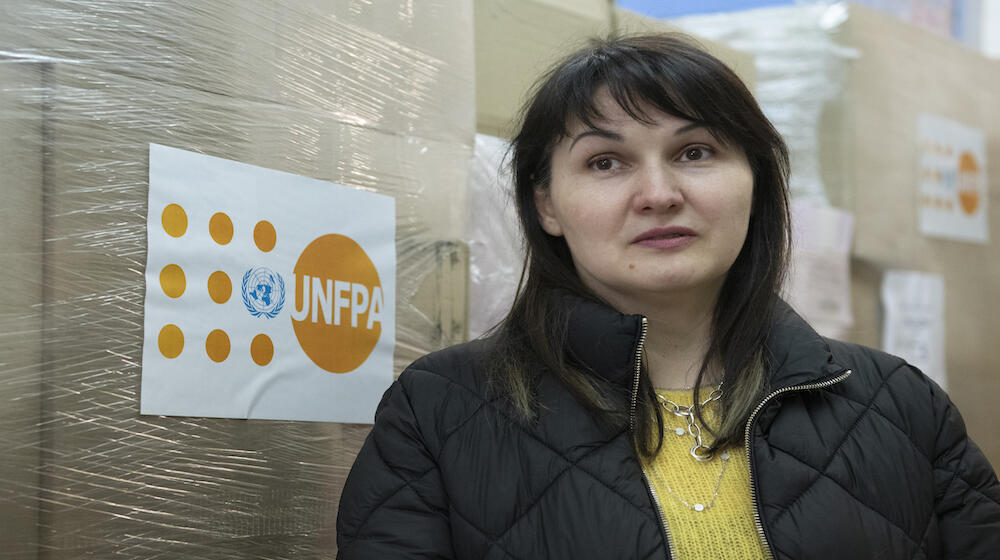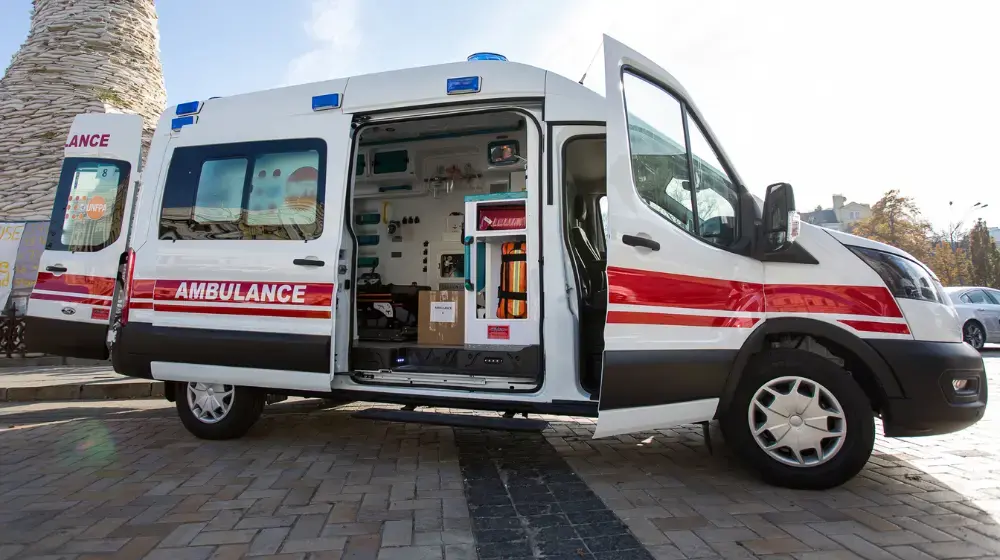Victoria Yalovska witnessed the formation and development of the Ukrainian social sphere, as she has been part of it since 1995. For a long time, she has been concerned with protecting the rights of women and children, and she focuses on helping women victims of violence. Adopting international experience in this field, Victoria is among those who create a national system for preventing and combating domestic violence. Helping others has always been central for Victoria Yalovskaya. But she found herself on the other side of the barricades on February 24, 2022, and was forced to seek support due to the start of a full-scale Russian war in Ukraine.
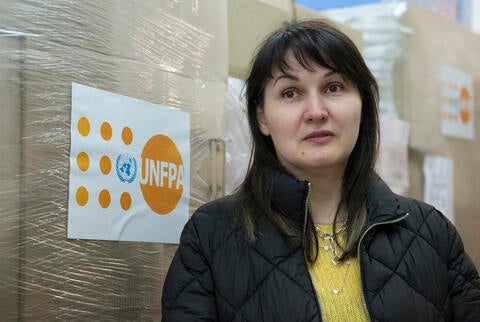
– Ms. Yalovska, please tell us about yourself and your life before the full-scale war of Russia against Ukraine.
– I am a teacher and lawyer by education. As a fourth-year student, I went to work at the Centre of social services for families, children, and youth. That's how I got into the social sphere and witnessed its formation. Lawmakers passed the first laws regulating the service and protection of children in those years (the 90s. - Ed.) Then I worked in state bodies—the Ministry of Social Policy, in the Office of the Ukrainian Parliament Commissioner for Human Rights. There were many business trips abroad. We studied the experience of Norway and Poland, and I have taken an interest in helping women who have suffered from domestic violence. In Spain, Norway, and Poland, we have seen shelters that actively help women. When the Ukrainian Foundation for Public Health invited me to work on these issues, I was very inspired to get the possibility to create such a system in Ukraine and started working in the public sector. Then, in 2016, the first shelter in Ukraine was opened in Kharkiv with the support of the United Nations Population Fund for women victims of domestic violence. A shelter that meets all international standards—with a secret address, social and psychological support, managing a woman's case, and identifying the care she and the child need. Now I am a UNFPA expert for the development of public systems and combating domestic and gender-based violence, working on the opening of such shelters and crisis rooms for victims of violence.
- Why is the issue of women's rights important to you?
- Whoever came into the social sphere does not leave it, because they understand their significance, and realize that they have the strength to help other people. The social sphere is as essential as, for example, the economic one. We all face social problems, difficult life circumstances, related to the illness of children or parents, the need to move as internally displaced persons, post-partum depression, and divorce. Someone has to help manage these challenges. Great if a professional assists in it. I came to this social sphere because I feel that I have the power to change something and to help. Moreover, I am from a female family with three children - I have three sisters. My mother always taught us that girls should be strong, rely on themselves, and study, instead of thinking that a weak woman should be behind a man. She taught me to be free and equal with men. Perhaps this has become the guarantee that I felt I could work in the social sphere.
- How did you feel when you realized that Russia had invaded Ukraine?
- When my husband told me that the war had started, I did not believe it. I was shocked… We turned on the TV, there were enough images to understand that it had become reality, but it was difficult to realize. My family and I spent five days in the basement of my daughter's school during the shelling. On the 7th day of the war, when Russians attacked the TV tower in Kyiv, we decided to leave because it was very close to our home. We decided to do it to protect our children. My eldest daughter is an adult, and the youngest is 15 years old. She was constantly following the news and was very worried. When I asked her if we leave, would she feel calmer, she agreed. During collecting a suitcase quickly, you reevaluate values. You realize what is important to you and what is not. First, you take your phone and laptop, because you need them for your job, your life. Then put a few things—and that is all, you do not need anything more. You realize that children and animals are your main value. That's how our family, dog, and cat moved to Uzhhorod.
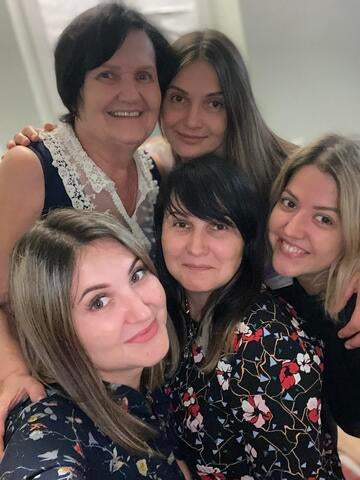
- Why did you choose Uzhorod?
- When you are involved in social projects, you do not think you can get into a difficult situation. You are inspired by your work and help. When the question of leaving appeared, and we thought about whom to turn to for help, foremost, my colleagues came to mind. I believed so much that they would help, and this came true. We lived for a month in the 'Nehemiah” Center in Uzhhorod. They host refugees, help those who need to go abroad and receive and deliver humanitarian aid throughout Ukraine.
- How did the war affect you and your family? What helps to hang in there?
- My sister lived in Irpin. She and her little daughter miraculously got out of the city after many days spent in the basement. One sister is now in Germany, another is in Poland, and another is in Turkey. All are in different places. When there are reports about Ukrainian cities being bombed, I can't stop crying, my soul is being torn. We helped to open shelters in Mariupol, Rubizhne, and Kharkiv, and a crisis room was planned to be opened in Severodonetsk. When there are reports that some city is being captured or already was occupied, like Kherson, for example, I immediately remember the people and what efforts we invested to set up the system there. When it's on the news that Starokostiantynyv is being bombed, I think about their crisis center, and our plans to open a crisis room there. There is also a crisis room in Uzhhorod, where we stay now. UNFPA work covered a lot of cities over the years… It is hard, very hard. We are worried so much about those who are not in touch and continue staying in Mariupol, Rubizhne. But as for now, the news about our colleagues is good, everyone is alive. Despite the war, the UNFPA team is very inspired—we support each other and make plans for further revival and development. The advice of colleagues-psychologists and keeping in touch with them are very helpful. They wrote that crying, worrying, and being afraid is okay. When I read the advice that we need to find an activity, we started volunteering—helping the displaced people. We were peeling potatoes, cutting cabbage, and listening to the news in the background all the time. The belief in our soldiers, in our army, that everything will be fine gives us the strength to live on and support others. I realized that instead of being stunned, I should find out how I can help. We live on and make plans.
- Do victims of violence currently have access to specialized services?
- Currently, all shelters are open, except those located in areas where active hostilities are taking place—like Rubizhne, and Mariupol. Now, they mostly host refugees, but if the victims apply for help, they don't deny assistance. No shelter, no crisis room is closed. There are specialists, but not in full force, because some have left. Those who remain are on duty around the clock, finding a way out of the situation. Day centers, which are located in relatively safe areas, also operate. The Kharkiv day center is currently closed, but experts consult by phone. If necessary, they provide people with the information on where to get humanitarian assistance.
- How does the war affect the prevalence of gender-based and domestic violence?
- The experience of other countries shows that amid the war and post-war times, the issue of domestic violence and violence against children is relevant as ever. We are currently unable to analyse appeals to the police on these issues. Police officers are primarily concerned with ensuring security and meeting the basic needs of civilians. We have no statistics that cases of violence have increased, as there is no increase in the number of appeals to 102 line. The analysis of those appeals received on hotlines also does not show an increase. We see that such appeals take place, but the experience of other countries shows that the increase in domestic violence will come after meeting the basic needs of the people. After all, war, in particular, destabilizes the psyche of people, which leads to aggression increase. War affects, but that effect is delayed. That is why we are now working ahead of a curve.
- What are the main challenges that the system of preventing and combating domestic violence faces?
- The main challenge is that we lost an important part of the system—the police. In a peaceful life, the police were those who had to stop the violence and redirect the woman to an asylum with a hidden address. Then the woman signed an agreement not to disclose the address, workers explained the expediency of this—to avoid the threat of the offender to her, other women, and workers. That is how it works in a peaceful life. Now we can't just tell the client where to go. And law enforcement, as I said, is busy with security, so this essential link has fallen out.
Another challenge is brain drain. Specialists go abroad to save lives. In large cities, where there are disruptions, for example, traffic, workers can not physically get to work, so they just had to spend the night in institutions.
The experience of other countries also shows that there are cases of sexual violence where there is war, and the occupiers leave no stone unturned. Usually, these cases are not exceptions, but systemic. Such appeals have already begun to appear. However, this problem will become bigger with time. We will hear about these cases when the victim will be in a safe place as she can't report these crimes in the occupation because of fear for life. This will be a great challenge for the system, as there is still no special institution in Ukraine for raped women. For example, in Europe, there are centers for the raped, where the woman gets medical, social, and psychological assistance, and if necessary – rehabilitation. Even before the war, we discussed that Ukraine needs at least one such center, but now we state that it does not exist yet. We will probably have to adapt existing models of assistance to such cases and train specialists to provide qualified help to those who have suffered from sexual crimes.
Another challenge will be the placement of orphaned children in family-based forms of care. This model will become prevention of ill-treatment and of return to the practice of boarding schools, which Ukraine has abandoned in recent years.
- How do all these change your work and the activities of UNFPA?
- We are already implementing new ideas to adapt to new conditions in Ukraine. Before the war, cities and communities set up and maintained mobile teams of sociopsychological assistance to victims of violence by themselves. But now the UNFPA has decided to take the lead on them, as funding of local communities is now mostly spent on war-related assistance. The work on this began in April, and we plan to launch 24 mobile teams in cities in 12 regions of Ukraine by the end of the month. They will include a psychologist and a social worker with transport so that they can get to the victims' places of residence. This will make life much easier for those who live in small settlements, as it is difficult for them to get specialized services, which are mostly located in large cities. Over time, such mobile teams will work all over Ukraine – in the territories controlled by the Ukrainian authorities. The team specialists will also consult by phone and will be in contact with the victims as much as they need. The main idea of launching mobile teams is to strengthen local anti-violence systems. Now many social service centres are involved in providing humanitarian assistance and resettlement, i.e. providing vital simple areas. The influx of people to the west of Ukraine is currently insane and all of them require social services. Therefore, the teams will work with both the local population and the IDPs, especially in places where they live compactly. Ukrainians abroad also require help and psychological support. Many of them do not know a foreign language, but they need to have access to assistance. Therefore, they will also be able to contact mobile teams by phone. The whole of our team united to quickly launch this model. Despite the war, everything must be done according to standards, with a focus on quality. We will attract specialists who have moved from the regions where hostilities continue, and also will recruit new ones. Their training will take place online, they will get constant support, supervision, and a system of monitoring and reporting.
Also, due to the war, the UNFPA decided to postpone the competition to attract new participants to the project "Cities and communities free from domestic violence." There are already 30 cities and communities in the project where anti-domestic violence systems are being developed or have just begun to be developed. There is a lot of work to do now, so the UNFPA decided to focus on those who have already joined the project. Specialists from the east of Ukraine also join this work. For example, our municipal consultant from Severodonetsk is currently volunteering at a shelter in Lviv to consult affected women.
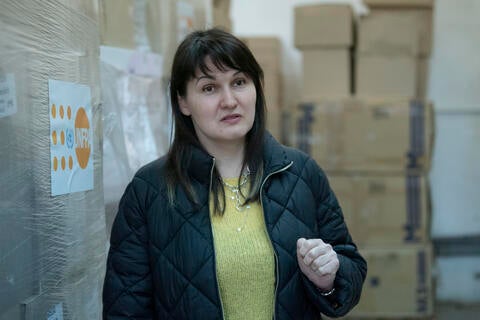
What are your plans?
- A few days before the full-scale war, we met with 15 colleagues from different parts of Ukraine in Kyiv and discussed the idea of creating an Association of social specialists who care about combating domestic violence. We discussed plans, our mission, and our vision. We planned to register it in the week when the war started. The war has made its adjustments, but now we want to return to this issue. I also really want to return home to Kyiv, my family did not leave Ukraine to be able to do so quickly. I plan to work, help, and stay positive. To share this positive with colleagues, do not think about the bad. We have many to rebuild and many to develop.
The project “Cities and Communities Free from Domestic Violence” is the UNFPA project supported by the Governments of the UK and Canada aimed at developing municipal systems for preventing and combating domestic and gender-based violence.
The purpose of the project is to improve the capacity and role of the municipalities in the development of sustainable mechanisms for protecting and assisting those affected by domestic violence.

